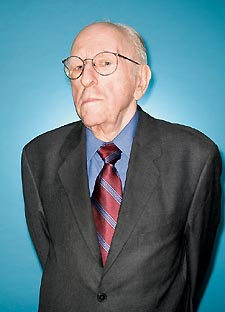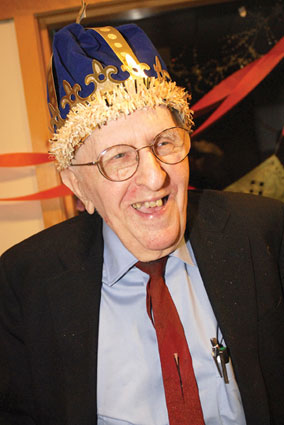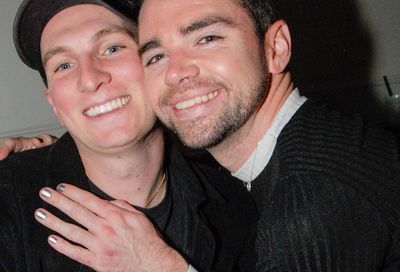Frank Kameny Dies at 86
For more than 50 years, the District legend fought for equality – from his own firing in 1957 to the end of DADT just weeks ago
Frank Kameny, 86, a pioneer of the modern gay rights movement, was found dead on Tuesday evening, Oct. 11, National Coming Out Day.
”It is with great sadness that I must report the death of Dr. Franklin Kameny, an activist and friend of the LGBT community,” Metropolitan Police Department Capt. Edward Delgado wrote in an email to media outlets on Oct. 11.
Speaking about 8 p.m. Oct. 11 from Kameny’s home, a designated historic landmark, Charles Francis confirmed that Kameny died in his bed and that his body was being removed. Others on the scene included Bob Witeck. Both Francis and Witeck were part of the effort to have Kameny’s personal papers installed in the Library of Congress.
Marvin Carter, board member of the organization Helping Our Brothers and Sisters, which aided Kameny, says he was contacted by Kameny’s housemate about 5:30 p.m. Oct. 11 and given the news that he had discovered Kameny’s body.
”It appears to have been of natural causes,” says Carter.
Kameny’s beginnings in advocacy work came after he was fired from his job as an astronomer for the Army Map Service because he was gay in 1957. He challenged the firing, though, and took the case all the way to the U.S. Supreme Court. Although the court declined to hear the case, an activist was born.
Kameny went on to become one of the leading advocates for lesbian and gay equality in the years before — and since — Stonewall. In 1961, he co-founded the Mattachine Society of Washington. In 1965, he and others with the group famously picketed the White House in shirts and ties, sending a letter to the White House explaining their presence.
Along with Barbara Gittings, Kameny successfully worked with experts in the field and others to convince the American Psychiatric Association to remove homosexuality from its list of disorders in 1973. The next year, he and Gittings served as counsel to Otis Fancis Tabler, Jr., successfully keeping the Defense Department employee from having his security clearance revoked due to being gay.
Witeck talked with Metro Weekly on Oct. 11 after returning from Kameny’s house, saying, ”When I was in high school 43 years ago – there’s nothing, nothing. No internet. Library books were atrocious. The only thing I knew was Frank Kameny’s name, from the newspapers, and the Mattachine Society. And I called the Mattachine Society, and I didn’t know it at the time – but that was Frank.
”Frank was the first gay person I spoke to in all of my life,” he says. ”And I wasn’t the only one with the story.”
Despite the many victories for equality of which Kameny was a part since, it wasn’t until June 24, 2009, that he received a formal apology from the government for his firing. In a letter that called the firing ”a shameful action,” the director of the Office of Personnel Management wrote to him, ”Please accept our apology for the consequences of the previous policy of the United States government, and please accept the gratitude and appreciation of the United States Office of Personnel Management for the work you have done to fight discrimination and protect the merit-based civil service system.”
The director, John Berry, is an out gay man and the highest ranking out LGBT official in the Obama administration.
Kameny’s death was noted quickly and felt widely across the LGBT community.
Rick Rosendall, who knew Kameny for the past 33 years through their work with the Gay and Lesbian Activists Alliance, told Metro Weekly, ”Frank was a force of nature. His level of courage and ferocity in standing up for his principles was amazing at a time when he had no backups.”
In his email, Delgado noted, ”Dr. Kameny is a friend of the Metropolitan Police Department’s Gay and Lesbian Liaison Unit; which he advised during it’s infancy stage. My condolences go out to the Kameny family and the entire LGBT community.”
Richard Socarides, who served as the lesbian and gay liaison to President Clinton, told Metro Weekly, ”Frank was such a brave person. To do what he did when he did it. A shinning example for us all. An amazing, inspirational figure who stands out among the giants of our movement.”
On June 10, 2010, a crowd gathered on 17th Street NW for the unveiling of the street sign naming the stretch of the street between R and Q Streets ”Frank Kameny Way NW.”
A little more than six months later, Kameny was present for another landmark moment – the signing of the Don’t Ask, Don’t Tell Repeal Act. The World War II veteran told Metro Weekly he was overjoyed to be attending because, as he said, ”I didn’t think I’d live to see it.”
Human Rights Campaign president Joe Solmonese noted in a statement, ”From his early days fighting institutionalized discrimination in the federal workforce, Dr. Kameny taught us all that ‘Gay is Good.’ As we say goodbye to this trailblazer on National Coming Out Day, we remember the remarkable power we all have to change the world by living our lives like Frank — openly, honestly and authentically.”
Witeck echoed that, saying, ”Frank also, truly, truly, was a lifelong lesson in being principled. It’s just an amazing gift – and an annoying gift. All of us have doubts; Frank didn’t have a one. If he did, he didn’t tell anyone.”
Talking about Berry’s role at OPM, the repeal of DADT and other successes of recent years, Witeck says, ”Every single thing that we have touched, Frank had been there before.”
A public memorial will be held, Witeck told Metro Weekly, noting that Nov. 15 is the 50th anniversary of the Mattachine Society of Washington and that, accordingly, plans were being considered to hold the memorial that day. He noted, though, that Kameny often said that he did not want a religious ceremony and that, as such, it would not be religious and would be held in a public place.
Support Metro Weekly’s Journalism
These are challenging times for news organizations. And yet it’s crucial we stay active and provide vital resources and information to both our local readers and the world. So won’t you please take a moment and consider supporting Metro Weekly with a membership? For as little as $5 a month, you can help ensure Metro Weekly magazine and MetroWeekly.com remain free, viable resources as we provide the best, most diverse, culturally-resonant LGBTQ coverage in both the D.C. region and around the world. Memberships come with exclusive perks and discounts, your own personal digital delivery of each week’s magazine (and an archive), access to our Member's Lounge when it launches this fall, and exclusive members-only items like Metro Weekly Membership Mugs and Tote Bags! Check out all our membership levels here and please join us today!






















